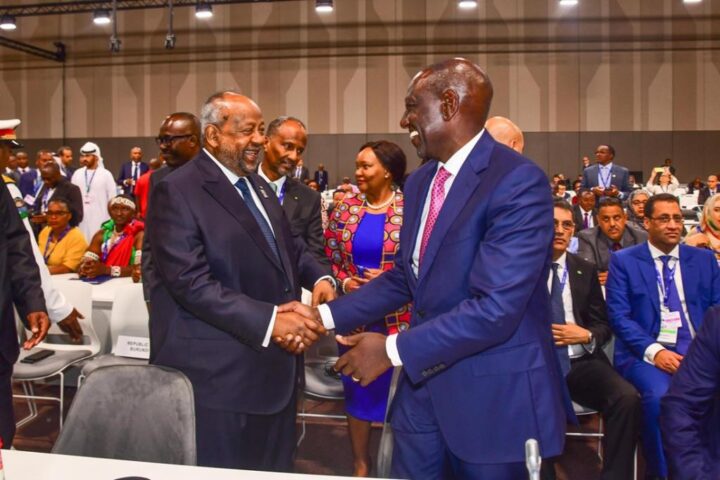WORLD leaders, delegates, and stakeholders all around the world are currently gathering for the COP26 in Glasgow, Scotland, United Kingdom. COP26 derives its name from the 26th Conference of Parties to the United Nations Framework on Climate Change (UNFCC).
CoP26 is also the third conference of the parties since the Paris Agreement of 2015. It would be recalled that the conference, which was due in November 2020, was postponed due to COVID-9 and its accompanying restrictions. Similar events have taken place in Copenhagen, Denmark (2009), Cancun, Mexico (2010), Durban South Africa (2011), Qatar(2012), Paris (2015).
Join our WhatsApp ChannelRecent experience around the world has seen climate change causing alarming variations in weather patterns and temperatures. Experts estimate that the long-term effects of the warming temperatures may spell more calamity in addition to the horrors experienced in the US, China, Germany, India, Pakistan, the Philippines and several other countries.
READ ALSO: COP26 Conference: British Envoy Calls For Strategy On Nigeria’s Nationally Determined Contributions
These changes or alterations in temperatures and weather patterns may be natural, but over centuries, these changes have been driven significantly by human actions such as burning fossil fuels like coal, oil and gas.
The spate of natural upheavals and their increasing devastating force has spurred the global demand for conscious effort and planned actions to manage this trend for the preservation of the earth and its species.
Notable among individual attendees are Prince Charles, who addressed the opening ceremony in person, US President Joe Biden, Ukrainian President Volodymyr Zelensky, German Chancellor Angela Merkel, and French President Emmanuel Macron.
However, China, which was referred to as one of the “largest polluters” by Czech prime minister Andrej Babiš, was absent at the CoP26 conference. It would be recalled that in October, China’s leader announced that he would not be attending the conference.
This was a major development which raised concerns among world leaders and prospective attendees. Russian president Vladimir Putin who was also absent from the conference, blamed his absence on the COVID-19 pandemic restrictions.
Notably, President Joe Biden’s 2022 budget proposal called for more than $36 billion to fight global climate change, an increase of more than $14 billion compared with 2021, with major new investments focused on clean energy, climate and sustainability research and improved water infrastructure.
The Consumer News and Business Channel (CNBC) listed Biden’s main spending areas on climate to include:
$10 billion for clean energy innovation,
$7 billion for NOAA research,
$6.5 billion for rural clean energy storage, transmission projects,
$4 billion for advancing climate research, $3.6 billion for water infrastructure,
$1.7 billion for retrofitting homes and federal buildings and
$1.4 billion for environmental justice initiatives
READ ALSO:UNEP 2021 Report Calls For More Funding Commitment To Climate Change Adaptation Effort
In September, Reuters reported that Biden told the United Nations General Assembly that he would work with Congress to double funds by 2024 to $11.4 billion per year to help developing nations deal with climate change. Biden made the commitment less than six weeks before the Oct. 31-Nov. 12 COP26 Climate Change Conference in Glasgow, Scotland.
The host of the conference, British Prime Minister Boris Johnson, said that meeting the climate finance target is key to building trust between developing and developed nations ahead of new negotiations since developed countries have failed to mobilize the $100 billion per year pledge by the original goal year of 2020.
Despite the significance of the CoP26, the conference and its founding principles have come under fire from many quarters. Swedish environmental activist Greta Thunberg, took to her Instagram page to criticise the CoP26, and the failings of the UNFCC.
“This COP26 is so far just like the previous COPs and that has led us nowhere. They have led us nowhere.
“Inside COP there are just politicians and people in power pretending to take our future seriously, pretending to take the present seriously of the people who are being affected already today by the climate crisis.
“Change is not going to come from inside there. That is not leadership – this is leadership.”
Similarly, Lang Banks, director of WWF Scotland supported Thunberg in her stance that politicians were not fulfilling their pledges, such as the promise of $100bn to help poorer nations cut emissions by 2020.
According to him, “The world leaders have not stepped up to the plate. They have an opportunity now to turn their warm words we’ve heard today into action.
We cannot allow them to leave Glasgow without making sure that we are somehow closer to making sure the planet does not burn, and does not warm above 1.5C.”
READ ALSO:EDITORIAL: On The e-Naira Saga
We at Prime Business Africa share the frustrations of those criticizing the COP26. If the leading polluters are foot-dragging on commitments, how would they muster the moral locus to ask other nations to commit to lowering emissions? Since a similarly frustrating experience of a largely non-committal meeting in Copenhagen in 2009, the world appears not to have learnt important lessons as the earth warms its way to more impending disasters.
Unfortunately, too, developing countries like Nigeria continue to ask for aid, which has not received any positive nod since the promissory notes began from Kyoto Protocol in Japan 1997.
At best, developed countries seem poised to face their economic interests such as selling electric cars and solar equipment to developing countries rather than making serious commitments to fighting climate change.
The implication is that the economic issues around climate change have dwarfed the environmental threat posed by the receding forests, warming arctic regions and melting polar ice. From all indications, there are no binding rules, and the climate change imbroglio is set to continue, and fearfully so.
Regionally, Nigeria needs more robust plans to articulate and address its own climatic problems. The Intergovernmental Panel on Climate Change, IPCC’s Fourth Assessment Report summary for Africa says that the trend of warming in Nigeria moves at a rate faster than the global average.
The variation will have negative consequences on food security because climate change impacts the biophysical as well as the social and institutional environments that underpin agricultural production.
For over 10 years, there have been consistent forecasts that Nigeria is one of the countries expected to be most affected by the impacts of climate change. Through sea level rise along Nigeria’s 800 km long coastline, there is intensified desertification, erosion and flooding disasters and general land degradation.
One forecast by a local newspaper is that ‘Nigeria will lose close to $9 billion as a result of the catastrophe while at least 80 per cent of the inhabitants of the Niger Delta will be displaced due to the low level of the oil-rich region. …’ Yet another analysis shows that ‘as the economy of the country grows, the gap between Nigeria’s per capita greenhouse gas emissions and those of developed nations of the world will continue to close.
Nigeria’s growing population will be put at greater risk if gas flaring continues and the country’s status as a major emitter of greenhouse gases will rise further.’ Already, President Buhari had blamed the persistent farmer-herder conflicts, which has killed 2000 people since 2016 on the effects of climate change on the Sahara, which drive herders down south where there is green grass for cattle.
We urge the federal government to revisit the former 2009-2012 state initiative of schools’ tree planting, and training of young people in building solar equipment. Other African nations must follow suit.
Deforestation, control of erosion and a renewal energy master plan need to be dusted and reinvigorated. What with Nigeria’s Renewable Energy Master Plan (REMP, 2012), and National Renewable Energy and Energy Efficiency Policy (NREEEP, 2014)?
Enough of begging for aid.
Hotline: +2348094000017












![Breaking: Tinubu Returns To Abuja After Europe Trip [Photos]](https://www.primebusiness.africa/wp-content/uploads/2025/04/Tinubu-returns-to-Abuja-Pohotos-2-150x150.jpeg)




![Gender Activism An Economic Necessity In Africa [PBA Editorial]](https://www.primebusiness.africa/wp-content/uploads/2023/11/vaw-720x480.png)
Follow Us